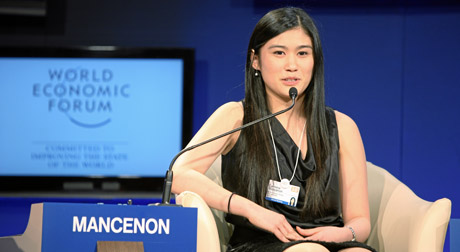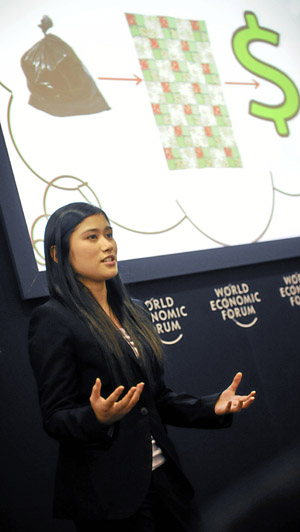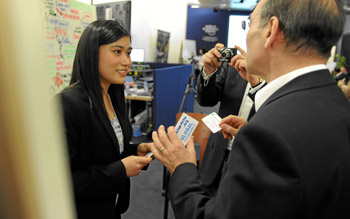A student at an international school in Tokyo shows that one person, no matter how young, really can make a difference.
Carmina Mancenon is no ordinary high school student. At the tender age of 16, she has already established her own nonprofit organization, and in January she attended the World Economic Forum in Davos, Switzerland, where she presented her project to international political and business leaders. She earned this opportunity after being one of six youths chosen by 60 of her peers to represent them as a part of the Global Changemakers program run by the British Council.
Last summer over 1,200 young people from 44 countries applied to the Global Changemakers program, and just 60 were selected to attend a week of workshops, lectures and skills training outside of London in November, called the Global Youth Summit. During the week, strong bonds were forged between participants from the far reaches of the globe, showing the students just how small the world can be. “It really gave us a chance to talk about the issues in our own countries,” said Carmina, whose home country is the Philippines.
Global Changemakers strives to inspire and cultivate young social entrepreneurs and activists. Before taking part in the program, Carmina had been active in raising awareness of the issues facing developing countries among the youth in Japan by helping to raise funds for various projects, including one that builds homes in Thailand. She also established the Kanto Plains Essay Competition, in which schoolchildren from around Tokyo submitted essays on international issues. But her experience at the Global Youth Summit prompted her to launch her most ambitious project yet: Stitch Tomorrow. Along with an Indonesian friend she met during the summit, Carmina runs this pioneering organization. About ten other Global Changemakers are closely involved in Stitch Tomorrow, which addresses the issues of climate change and poverty by engaging youth from across the developed world.
The idea behind Stitch Tomorrow is simple: the organization provides training, capital and resources to underprivileged youth in South East Asia in order to help them launch their own fashion businesses. The clothes are largely envisioned by young designers in the developed world, but design training is also provided so that eventually those in the developing world can be completely self-sustaining. Once this happens, they pay back their initial loans to Stitch Tomorrow, and the interest is used to fund another batch of new designers. An added environmental benefit comes from the fact that the clothing is made from recycled fabrics taken from old clothes that are donated to the organization. The final collections will soon be available for purchase online at www.stitchtomorrow.org, where those interested can also send donations and get involved in other ways.
Along with her five co-participants, Carmina presented her project at the World Economic Forum IdeasLab. Before leaving for Davos, she mentioned that this was one part of the Forum that excited her the most. “I’m really looking forward to giving my ideas and having these leaders listen to me,” she had said. The IdeasLab was attended by a broad spectrum of world influencers, including possible future investors.
But more than financial support, Carmina was happy to be able to receive helpful pointers from her audience. “The biggest takeaway for me was listening to advice from these world leaders about how I should go about tackling my project. It definitely put a lot of things into perspective,” she said.
Now that Carmina is back in Tokyo, completing her senior year at K International School, she has had time to reflect upon her experience.
‘No matter who you are— whether you’re 16 or 50 —there is always a way for whatever vision you have to become a reality.’
 “As a teenager amidst all these people who are immensely successful in their own way, I didn’t expect the warmth that I felt from them. I was surprised by how readily people were genuinely willing to listen to my take on situations, have deep conversations and get involved with our projects. It really showed me that no matter who you are—whether you’re 16 or 50—there is always a way for whatever vision you have to become a reality,” she said. Carmina also admits that her experiences through the Global Changemakers program have drastically changed her vision for her future. She’s currently deciding between attending university in the US or the UK, with a major in economics or engineering. She plans to continue her social activism, and has dreams of working in public healthcare or running her own organization. At just 16, she’s well on her way to making this dream a reality.
“As a teenager amidst all these people who are immensely successful in their own way, I didn’t expect the warmth that I felt from them. I was surprised by how readily people were genuinely willing to listen to my take on situations, have deep conversations and get involved with our projects. It really showed me that no matter who you are—whether you’re 16 or 50—there is always a way for whatever vision you have to become a reality,” she said. Carmina also admits that her experiences through the Global Changemakers program have drastically changed her vision for her future. She’s currently deciding between attending university in the US or the UK, with a major in economics or engineering. She plans to continue her social activism, and has dreams of working in public healthcare or running her own organization. At just 16, she’s well on her way to making this dream a reality.
External Links:
Global Changemakers
World Economic Forum










